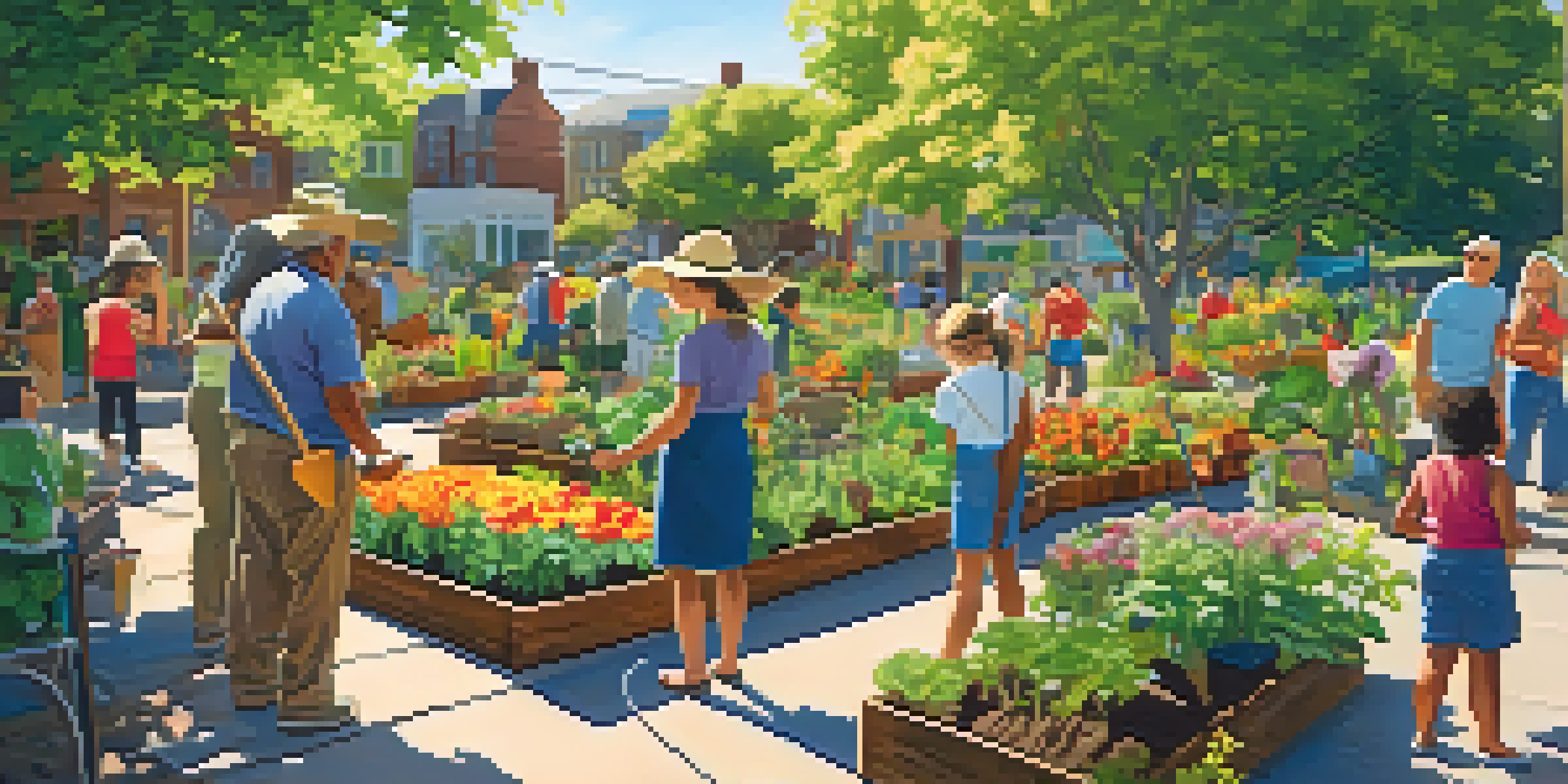The Impact of Community Gardens on Mental Health in Cities

Understanding Community Gardens in Urban Settings
Community gardens are shared green spaces where individuals come together to grow plants, vegetables, and flowers. In cities where concrete often dominates, these gardens offer a refreshing contrast, creating pockets of greenery. They not only beautify neighborhoods but also serve as vital community hubs, fostering social connections among residents.
Gardening adds years to your life and life to your years.
These gardens can vary widely in size and design, from small plots in backyards to expansive community farms. They often involve local volunteers who dedicate time and effort to cultivate the land. By participating in these gardens, individuals can experience the joy of nurturing plants and watching them thrive over time.
Importantly, community gardens provide access to fresh produce, which can be hard to find in urban food deserts. This access not only promotes healthier eating habits but also encourages physical activity, as tending to a garden can be a great form of exercise. Overall, they play a crucial role in enhancing the quality of urban life.
The Link Between Nature and Mental Well-Being
Numerous studies have shown that spending time in nature can significantly boost mental health. Nature has a calming effect, reducing stress and anxiety levels, and improving overall mood. Even a short walk in a garden can help clear the mind and provide a sense of peace amidst the chaos of city life.

Engaging with nature stimulates the senses, offering sights, sounds, and smells that can uplift spirits. For instance, the vibrant colors of blooming flowers or the soothing sound of rustling leaves can create a sensory experience that promotes relaxation. This connection to nature is especially vital in urban areas where green spaces may be limited.
Community Gardens Boost Well-Being
These shared spaces enhance mental health and social connections while providing access to fresh produce.
Moreover, community gardens create an environment that encourages mindfulness. As individuals plant seeds or tend to plants, they often find themselves immersed in the present moment, allowing worries and negative thoughts to fade away. This mindfulness practice can lead to improved mental clarity and emotional resilience.
Social Connections Fostered by Community Gardens
Community gardens serve as a gathering place, bringing people together from diverse backgrounds. This sense of community can combat feelings of isolation and loneliness, which are common in urban settings. When individuals collaborate on gardening projects, they create bonds that often extend beyond the garden itself.
The best way to find yourself is to lose yourself in the service of others.
The act of gardening together can lead to shared experiences and friendships. Whether it's exchanging gardening tips or celebrating harvests, these interactions help foster a sense of belonging. For many, these connections can be a lifeline, providing support and camaraderie in an often disconnected urban landscape.
Additionally, community gardens can promote intergenerational interactions. Children, adults, and seniors often work side by side, sharing knowledge and stories. This exchange not only enriches the gardening experience but also strengthens community ties and enhances social cohesion.
Therapeutic Benefits of Gardening Activities
Gardening itself can be a therapeutic activity, promoting physical and mental health. The repetitive actions involved in planting, weeding, and watering can serve as a form of meditation, helping to reduce anxiety and depression. This hands-on approach allows individuals to focus their energy on nurturing life, which can be incredibly rewarding.
Moreover, community gardens often provide structured programs, such as gardening workshops or mindfulness sessions. These programs can equip participants with valuable skills while also fostering a sense of achievement and purpose. Engaging in these activities can lead to increased self-esteem and confidence, contributing to overall mental well-being.
Gardening Fights Food Insecurity
Community gardens empower individuals by offering a local source of fresh food, addressing urban food deserts.
The act of growing food can also instill a sense of pride and accomplishment. Harvesting the fruits of one's labor is a tangible reminder of what can be achieved through dedication and care. This sense of achievement can positively impact mental health, reinforcing the idea that individuals can influence their environment and well-being.
Addressing Food Insecurity Through Community Gardens
Food insecurity is a pressing issue in many urban areas, often leading to increased stress and anxiety for affected individuals. Community gardens can play a vital role in addressing this issue by providing fresh produce to those in need. By growing food locally, these gardens help alleviate some of the burdens associated with food deserts.
Participating in a community garden can empower individuals to take control of their food sources. This empowerment can lead to improved mental health, as feeling secure in one's access to food can reduce anxiety. Additionally, sharing harvests with neighbors fosters a sense of community and support, further enhancing well-being.
Furthermore, many community gardens implement programs that educate participants about nutrition and sustainable practices. By learning how to grow and prepare healthy food, individuals can make better dietary choices, contributing to both physical and mental health improvements. This holistic approach to food security can create a ripple effect, positively impacting entire neighborhoods.
Environmental Benefits of Community Gardens
While the mental health benefits of community gardens are significant, their environmental advantages should not be overlooked. These green spaces contribute to urban biodiversity, providing habitats for various species, including pollinators like bees and butterflies. By fostering this biodiversity, community gardens play a crucial role in maintaining ecological balance in cities.
Moreover, community gardens help improve air quality by absorbing carbon dioxide and releasing oxygen. This can lead to a healthier urban environment, which is essential for overall well-being. The greenery also helps mitigate the urban heat island effect, providing cooler areas during hot summer months.
Gardens Promote Physical Activity
Engaging in gardening provides a full-body workout while encouraging a sense of community and purpose.
In addition, community gardens often promote sustainable gardening practices, such as composting and organic gardening. These practices not only reduce waste but also educate individuals about environmentally friendly choices. By cultivating a culture of sustainability, community gardens contribute to the health of both the community and the planet.
Encouraging Active Lifestyles Through Gardening
Gardening is a surprisingly effective way to incorporate physical activity into daily routines. From digging and planting to weeding and watering, gardening tasks can provide a full-body workout. This physical engagement can enhance overall fitness levels, which in turn supports mental health.
For many urban dwellers, finding opportunities for exercise can be challenging. Community gardens offer a unique solution by combining physical activity with a sense of purpose. As individuals work together to maintain the garden, they inadvertently boost their physical health while enjoying the therapeutic benefits of nature.

Additionally, the social aspect of gardening encourages people to remain active. Group activities, such as planting days or community harvest festivals, can motivate individuals to participate regularly. This combination of fitness, social interaction, and mental engagement creates a holistic approach to well-being in urban environments.